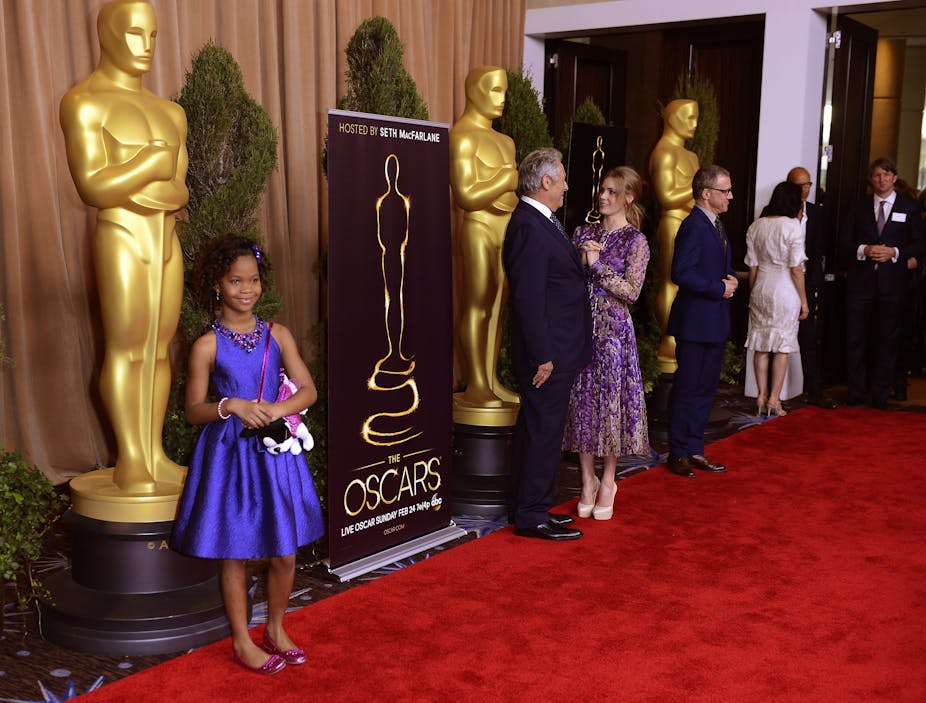Young actress Quvenzhané Wallis was one of many women subjected to derogatory misogynist “jokes” during this year’s Academy Awards ceremony. Those directed at her were particularly vicious. When the satirical website The Onion tweeted that she was a c***, and host Seth McFarlane made a remark with paedophilic overtones connecting Wallis with George Clooney, her age and gender were the apparent sources of prejudice against the nine-year-old.
Outrage rightly erupted, and The Onion has now apologised. Few commentators in the mainstream media, however, have made links between the way in which Wallis was singled out and her race.
What’s in a name?
As well as the insults directed at Wallis during the ceremony, some reporters professed they could not pronounce her name before it. One Academy member even claimed not to have voted for her because of it.
Names are important markers of our identities, of who we are as people, but they can also be used to discriminate. A recent Harvard University study showed that searching for names considered “Afro-American” on Google generated ads for companies such as Instant Checkmate, a company that checks criminal records for customers.
There’s no doubt Quvenzhané Wallis’ name marks her as racially different to the other nominees for Best Actress. Yes, all the nominees in this category were the indirect, if not direct, targets of ridicule during the Oscars ceremony – McFarlane’s opening musical number We Saw Your Boobs was just one example of this. But being African-America, Wallis was the target of a direct, multi-layered attack.
Marginalising women of colour
The way Wallis was marginalised and denigrated before and during the ceremony reflects an insidious culture in Hollywood, and in our culture more broadly. Wallis’ role could only have been played by a black actor, but there is a marked tendency in Hollywood movies to either minimise or write out black stories if at all possible.
Steven Spielberg’s Lincoln, nominated for 12 Academy Awards, tells the story of the 16th American president’s fight to end slavery. It does so, however, in a way that confines African American characters in only the most minor roles. Significant historical figures such as Frederick Douglass, an escaped slave and passionate advocate for abolition, are entirely absent. As Michael Swank has pointed out in The Washington Post, those characters who do appear – Elizabeth Keckley and Lydia Hamilton Smith – are shortchanged.
Rather than being marginalised, often non-white characters are simply written out of films.
A particularly infamous example of this was M. Night Shyamalan’s 2010 The Last Airbender, based on Nickelodeon’s animated film Avatar: The Last Airbender. The cast of the Shyamalan film originally comprised only white actors, whereas the preceding animated series featured four protagonists of Asian and Inuit backgrounds. A later cast change saw a non-white character included. Perhaps unsurprisingly, that character was the villain.
This “white-washing” outraged fans so much that it sparked an online political campaign against a phenomenon that came to be known as “racebending” – choosing white actors to play characters who were originally not white.
Audience prejudice
Audiences, however, are not universally in favour of diversity in Hollywood movies. The choice of a black actor, Idris Elba, to play Norse god Heimdahl in the movie Thor drew some extremely negative responses, including calls to boycott.
African American cast members in The Hunger Games (2012) accurately represented the characters in Suzanne Collin’s books. Some fans nonetheless complained that they had been included for politically correct reasons only.
Conversely, The Hunger Games also attracted attention because the casting call for Katniss Everdeen – who is described as having olive skin and dark hair in the novel – requested only “Caucasian” actresses.
This final example garnered enough attention for coverage to eventually find its way into The Huffington Post, but went no further.
Last week, controversy was raised by racial stereotyping in a casting call for the Ewan McGregor movie Son of a Gun, currently shooting in Western Australia.
Post-race? We wish
Some, if not all, of the controversies outlined here attracted attention from the mainstream media. But these brief stories about race in Hollywood are rare breakthroughs for a major issue that generally goes uncovered.
The silence around these issues reinforces the idea that race doesn’t matter. And audience responses, such as those to The Hunger Games, demonstrate that a post-race society is at best wishful thinking.
And so, when a nine year-old African American girl with an “unusual” name was attacked by a white, male host, all we talked about was gender.
Race was the largely undiscussed source of prejudice at this year’s Oscars. Audiences and opinion makers must recognise and reject racism’s ugly presence if it is to be truly eradicated.
Perhaps we could all start by learning to pronounce Quvenzhané.

